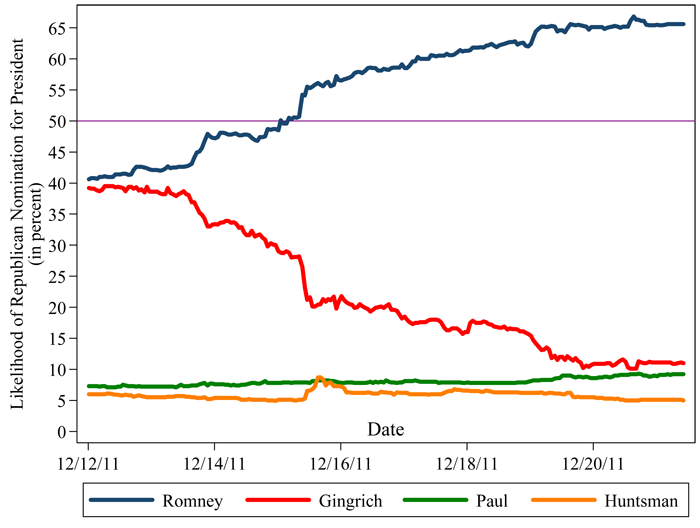Another anyone-but-Romney collapse: Guess who’s the front-runner again?
Mitt Romney again solidified his front-runner status this week as Newt Gingrich's anyone-but-Romney position collapsed. Prediction market data, including Betfair and Intrade, now give Romney a 65.6 percent likelihood of victory in the Republican primary, compared to Gingrich's 11.0 percent and Ron Paul's 9.2 percent.
Gingrich's decline in Iowa is persistent and sharp, his possible routes to the Republican nomination increasingly limited. He has trailed Paul or Romney in each of the last 4 polls of Iowa voters (Rasmussen, ISU, PPP, Insider Advantage); in the last 2 polls, he trails both of them by a sizable margin. Contrast that with how things looked on December 12: prediction markets had Gingrich's likelihood of winning Iowa near 60 percent. After that date, he started moving slowly downward before the possibility of victory in Iowa fell precipitously when the polls began showing declining support for him.
Gingrich now has an 8.0 percent likelihood of winning in Iowa and just 18.5 percent of coming in either first or second in the caucuses. His 11.0 percent likelihood of winning the nomination is optimistic.
While an all out victory in Iowa would give Gingrich about a 2 in 3 likelihood of winning the nomination, a second place finish would leave him a long shot. If Romney wins, the former governor's momentum after a likely New Hampshire win would be massive. If Paul comes out ahead of Gingrich, he would likely become the any-but-Romney candidate (also a possibility, however less likely, for Jon Huntsman). Either way, Gingrich would be weak.
Paul's 45.0 percent likelihood of winning Iowa, and his 58.2 percent likelihood of either winning or coming in second in New Hampshire, turns him into a serious candidate; the markets now give him a 9.2 percent likelihood of winning the nomination. Of course, Paul still has a long route to the Republican nomination, even if he were to win Iowa.
Unlike Gingrich, who would be a favorite to win the nomination if he can carry Iowa, Republican leaders say that rather than making Paul relevant, a victory in Iowa would be an indicator of Iowa's irrelevance. Compared to Gingrich, Paul still has sluggish national poll numbers. Gingrich is still leading many national polls with Paul a distant third, and Paul's libertarianism sits further outside the mainstream Republican platform. Further, he is relatively un-vetted by the American people. Still, while the media will downplay a win in Iowa, a one-two combination of Iowa and New Hampshire would propel Paul into the national debate.
Nothing in the numbers indicates a new swell of support for Romney; the failure of yet another anyone-but-Romney candidate is giving him a lift. A Real Clear Politics aggregated trend average of Republican support has moved from 24.3 percentage points on November 1, 2011 to 24.6 percentage points on December 21, 2011. Political talk is all about Romney's opponents, not him; Paul dominates search and Twitter traffic, with Gingrich and others tending to generate more social buzz than Romney, too.
Romney may look weak by not gathering any momentum with the electorate, but it is likely to be a winning strategy for the Republican nomination. Gingrich earned headlines this week by talking about arresting federal judges who make "controversial rulings"; former George W. Bush attorney general called the proposal, "dangerous, ridiculous, totally irresponsible, outrageous, off-the-wall and [he asserts it] would reduce the entire judicial system to a spectacle."
Meanwhile Romney, when confronted about the payroll tax debate, preferred to "keep a safe distance from the fray in Washington," as CBS correspondents Sarah Boxer and Sarah Huisenga put it. While he talked about how assertive he will be when he is president, he declined to be assertive now. Entering the payroll tax debate carries a risk; he could end up being associated with a losing policy (or lack thereof). But, it would have made news if he actually pushed. With opponents imploding all around him, Romney seems to feel that despite the possible reward, speaking up is not worth the gamble.
Follow along on PredictWise for the real-time likelihood of the Republican nomination and the individual Republican primaries.
David Rothschild is an economist at Yahoo! Research. He has a Ph.D. in applied economics from the Wharton School of Business at the University of Pennsylvania. His dissertation is in creating aggregated forecasts from individual-level information. Follow him on Twitter @DavMicRot and email him at thesignal@yahoo-inc.com.
Other popular Yahoo! News stories:
Can Romney get the GOP nomination without winning South Carolina? Inside his mysterious campaign in the Palmetto State
Down but not out for the holidays: For Yahoo's jobless readers, season poses a challenge
Now that Iowa is a dead heat, Romney is national GOP frontrunner again
Want more? Visit The Signal blog or connect with us on Facebook and follow us on Twitter.



